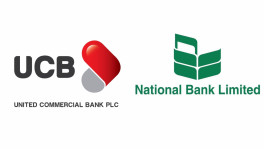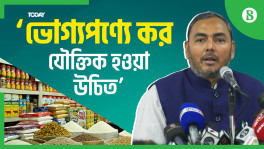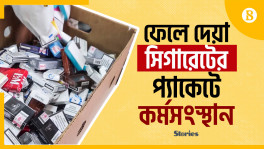RMG worker Sadeka is applying to Cambridge, and ‘Pathways for Promise’ brought her here
The program mostly trains girls from underprivileged communities – RMG workers, tea estate workers, ethnic minorities as well students from war-torn countries like Afghanistan

When Sadeka left home to come and work in an RMG factory in the capital five years back, she would never have imagined that one day she would be applying for a Master's degree at Cambridge University in Development Studies and Management.
She was only four months into her job as a quality inspector at a garment factory of Ananta Group when she discovered a program called Pathways for Promise that offered ways to underprivileged factory workers like Sadeka to complete their education.
Sadeka Jaman had only studied till Grade 12. She sat for an admission test to get into the year-long program that prepared students for an undergraduate program at the prestigious Asian University for Women (AUW) in Chattagram. If she finished the first year, she would be allowed into the undergraduate programme.
"I never thought I would graduate, let alone stand on podiums delivering speeches. I grew up in a village where early marriage is the norm; where girls are considered to be a burden," said Sadeka, who comes from a distant village of Sunamganj and is currently an intern at a UN organisation.
Sadeka added, "When I was in Grade 12, my relatives were forcing my parents to get me married. But I was a girl with a dream to be empowered and become an independent woman. Pathways for Promise and AUW made it possible for me to pursue this dream and turn it into a reality."

What is Pathways for Promise?
Pathways for Promise at the AUW is an undergraduate preparatory programme. The programme takes in around 15 to 20 students like Sadeka Jaman every year and grooms them for undergraduate studies at the university.
The program mostly tries to train girls from underprivileged communities – RMG workers, tea estate workers, ethnic minorities as well students from war-torn countries like Afghanistan – in Mathematics and English so that they have a grasp of the basics before they get into an undergraduate programme.
Currently, the programme enrols students from 18 countries in Asia and the Middle East.
Last year, along with Sadeka Jaman, three other RMG workers - Shathy Halder, Shahnaz Ara Khanam, and Yeasmin Akhter Urmy - graduated from AUW as the first batch of the pathway programmes.

Now, Urmy has been offered to join IPDC as a junior relationship manager. Shathy is currently working in Mohammedi Group in the compliance department and Shehnaz is looking for jobs in international NGOs.
Pathways for Promise was the brainchild of Kamal Ahmed, founder of AUW. He came up with the programme after the Rana Plaza tragedy in 2013 and operations began in January 2016. But its journey began way back.
At the age of 13, Kamal used to teach street children in the Dhaka University area where his father and grandfather used to teach. Kamal said, "As I worked with these young children, I came to see how some of them were exceptionally intelligent and thrived at the slightest opportunity to learn. That lesson stayed with me all my life."
Later in his life, Kamal founded AUW. The idea was to educate women from all across South and South-East Asia, and the Middle East. Women from these regions, because of their socio-economic background, could have never otherwise accessed the best educational opportunities.
After the Rana Plaza tragedy in 2014, Kamal started exploring the prospect of educating RMG factory workers in Bangladesh and Cambodia at AUW.
Later in 2015, Kamal consulted with his childhood friend Dr Rubana Huq, president of Bangladesh Garment Manufacturers and Exporters Association (BGMEA), who was pursuing her PhD degree back then, to incorporate the Bangladeshi garments factories with his educational programmes.
"I thought that if I could have a dream, the women who sit behind the sewing machines can also have a dream. It was like an awakening for me when Kamal came to me and asked whether we wanted to do something for the workers," Rubana said.
How is the selection done?
Suman Chatterjee, director of marketing and recruitment of AUW, said, "We first shortlist the RMG workers who have passed their HSC exams. Then we call them for the interview and admission tests. Their selection is based on their test performances."
Students are assessed on their leadership skills, critical thinking skills and problem-solving abilities. They also consider the special circumstances and backgrounds of these RMG students. For instance, educational gap years, mental health, etc. as long as the students have the merit to pursue a university degree.
Rubana's Mohammadi Group became AUW's first partner for this program and the first four students of the program came from her factory. She said, "We decided to open our factories for admission and hold admission tests. Four girls were initially selected and then other factories followed. This is how the programme started."
The programme provides full scholarships to the students, covering all their expenses -- accommodation, tuition, health care, books and transportation. Besides, the RMG students received salaries for the five years of their enrolment at AUW. These allowed them to take care of their families while continuing their studies.

Currently, 70 students from RMG sector are enrolled in the programme and they are presently pledging to have 100 more for this programme.
Initially, Ikea Foundation, and later Levi Strauss Foundation and Ralph Lauren Company, took the responsibility of financing the scholarships for the program.
Following the success with the RMG workers, AUW extended the program to workers from tea estates in Bangladesh, Sri Lanka, Assam and to the madrasa students from different parts of Bangladesh along with various tribal communities in the country.
Not just Maths and English
Although the programme mainly focuses on English language and mathematics, which primarily covers elementary pre-calculus, the pathways programme also incorporates courses on art and culture. This allows the students from different cultural backgrounds and languages to communicate better.
One of the graduates from this year, Shathy Halder, said, "We were grouped into several clusters based on our needs. Someone might need more emphasis on English while others may need more time for maths."
There were also common classes where they would learn about different cultures and skills. The programme increased their skills on presentation, speech delivery, basic computer skills, etc.
Shathy added, "At first it was tough for me. I had never had a conversation in English but our teachers were not Bangla speakers. So we had no option but to communicate in English and this made our communication skills stronger."
After completing the Pathways programme, students are promoted to an access programme. Here, they are trained more with correspondence to the academic curriculum. After this process, students are given opportunities to choose a subject to major in.

Sadeka majored in finance and now she wants to pursue a masters degree in Development Studies and Management from Cambridge University.
A call to conscience
According to Dr Rubana Huq, this programme is beneficial to the factory owners as well. She believes that we live in a world which is not about our balance sheets only. We also have to have valid accounts of our balanced conscience.
She said, "It's time for our factory owners to do good and I think it is important to leave a positive impression in their global community as well."
Rubana believes more universities should come forward with such programmes for the RMG workers and the underprivileged people, but not necessarily with separate academic institutions for them.
"I believe that while children from the privileged background can, children from the underserved community should attend institutions and I believe that it is important for students to learn to accept diversity and be all-inclusive," Rubana voiced.
However, due to the Covid-19 pandemic, students are at home now as educational institutions are closed. This worries Kamal. Most of these women do not have distant learning opportunities. After the pandemic, everyone may not return. But he is hopeful to continue this journey to make a change.
Kamal said, "We wanted to break through with this programme because of the classist society's mindset - no matter which community you come from, everyone has the rights to education and to dream."


 Keep updated, follow The Business Standard's Google news channel
Keep updated, follow The Business Standard's Google news channel
















